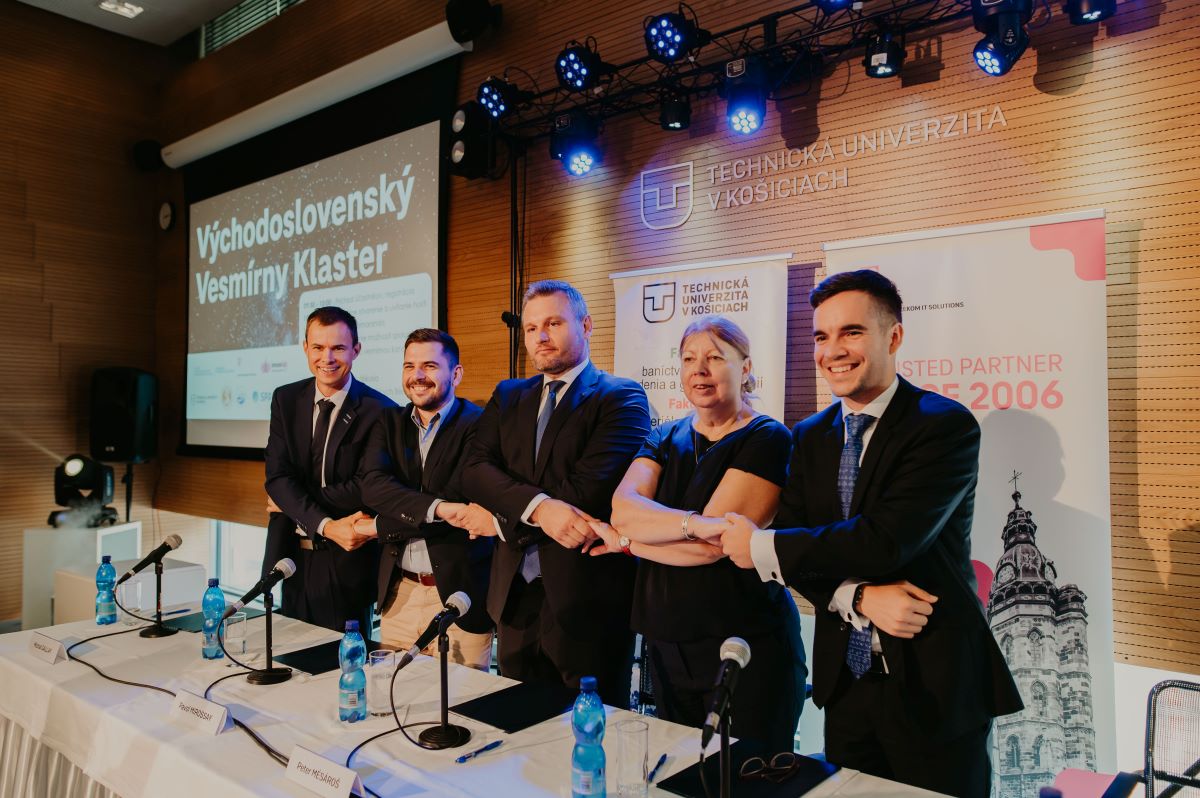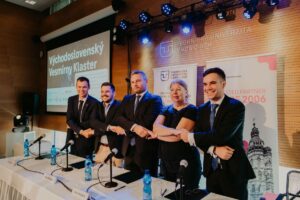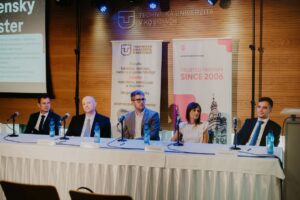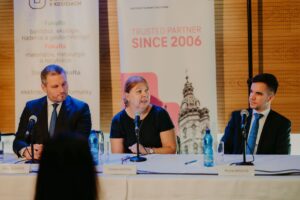The Space Cluster emerges in Košice – the first of its kind in Eastern Slovakia

Representatives of the Institute of Experimental Physics, Deutsche Telekom IT Solutions Slovakia (DT ITSO SK), Technical University of Košice (TUKE), The Slovak Investment and Trade Development Agency (SARIO) and Pavol Jozef Šafárik University (UPJŠ) have officially began a cooperation on creation of Space cluster, the only one of its kind in Eastern Slovakia.
All institutions involved consider the Memorandum of cooperation as the first joint step. The space economy is experiencing a rapid global growth and in the following years will open new possibilities for research and innovations, as well as increasing the competitiveness of Slovak technology companies.
“The space sector has online data collected by satellites over several years. It is a great source for data analysis and creation of prediction models. At DT ITSO SK, we are also starting to focus on this segment. We have committed to climate-neutral business practices, and such space data can be utilized for practical support and fight against climate changes. We are very proud that we have an in-house developed concept study to prevent satellite collisions with space debris. The awarded solution is an example of the cooperation between local companies and universities. For us, that was an impulse for signing this memorandum,” said Andreas Truls, Managing Director of DT ITSO SK.
The center for space research will attract scientists and engineers
The main goal of the cluster is to effectively associate and connect interested subjects involved in research and development, commercial or popularization activities in the field of space technologies, as well as creating support ecosystem for the emergence of new innovative startups, offering new products and services utilizing space technologies.
“Cluster has an ambition to be a strong consortium, which involves representatives of private, academic, public as well as non-profit sector. In this grouping, it will be easier to coordinate activities and obtain funds for joint research and development or educational projects, which will help to further accelerate the development of the space ecosystem in the Eastern Slovakia. The idea of creation of cluster emerged during the regular online meetings with the representatives of the East Slovak space ecosystem, which we initiated at SARIO as part of the Slovak Space Office project with the aim to help the region to fully utilize its strong potential for the space sector,” said Michal Brichta, director of the industrial branch of the Slovak Space Office (SARIO).
The companies that signed the memorandum of cooperation also agree that the creation of a space ecosystem has the task of attracting or keeping scientists and engineers in the Košice region.
“We do realize that if we want to continue our participation on important scientific projects and attract or keep top scientists, we need a functional ecosystem which exceeds our Institute. We have been dealing with cosmic physics in Košice over 50 years. During this time we participated in building dozens of instruments for important space missions (such as Rosetta, BepiColombo, JUICE) and published hundreds of papers on phenomena in the near space region. Our research will continue developing if we have enough well-educated scientists and if we can transform our knowledge to products and services in cooperation with industry. Thanks to our close cooperation with European Space Agency (ESA), we want to mediate new opportunities for the entire region,” said doc. RNDr. Zuzana Gažová, DrSc., director of the Institute of Experimental Physics.
Pavol Jozef Šafárik University considers membership in such cluster as an opportunity, which was also confirmed by doc. Mgr. Michal Gallay, PhD., vice-dean for external relations of the Faculty of Science UPJŠ. “UPJŠ is a relevant partner with experiences that we would like to share. Already at the beginning of the use of space during the last century, some of our workplaces participated in the INTERKOZMOS program, participated in the research program at CERN, and in recent years solved projects within the Program of European Cooperating States with European Space Agency (ESA PECS). We are member of the European association Copernicus Academy, which covers institutions providing education based on space technologies and supports new companies.”
The challenges of the space segment will be implemented in Košice
The space cluster will be focused on development of space ecosystem, projects and acquisition of financial resources for the development of this ecosystem.
“By the development of the space ecosystem in the region we understand that we as a cluster will jointly respond to the challenges of the space industry segment, ESA and the EU and together prepare suitable conditions for the creation of new products, projects or innovations. For people who want to work in this industry, it is necessary to prepare attractive jobs and interesting study opportunities so that they decide to study and work in our region,” adds Milan Varga, manager of Innovlab Startup Center, DT ITSO SK.
The cluster will primarily function within the whole region of Eastern Slovakia, therefore relevant entities from both eastern Slovakian regions are welcome. The space cluster will be located in the University Science Park TECHNICOM, which represents a neutral environment for connecting industry and academia, and which also serves as a hub for young startupists – students of the Technical University of Košice.
“We are excited that the cluster will be based in our science park, which is also the residence of other important clusters such as Košice IT Valley and several research alliances and workplaces cooperating with industry. UVP TECHNICOM, as an ecosystem for the acceleration of technological transfer and innovation at TUKE, creates conditions for the development of scientific research activities in the region, for their connection with business and for the support of innovations. It thus offers a suitable location for the establishment and development of this new space cluster,” says vice-rector for innovation and technology transfer at TUKE, prof. Ing. Juraj Gazda, PhD.



 Contact
Contact Intranet
Intranet SK
SK






